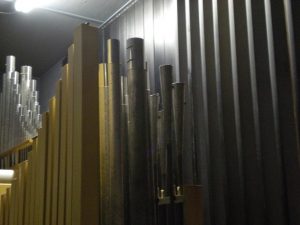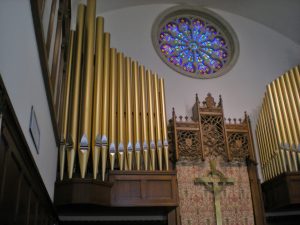
Tribute to David Kocsis
My dad, not a church-goer, loved to come to First Presbyterian to hear David play. After one of the Christmas Eve services, which included an ensemble of High School students, dressed in black tie and formal gowns and accompanied by David, my dad said, “That was the nicest Christmas program I’ve ever been to.”
I once mentioned to him that someone on our staff was leaving. My dad was alarmed, “You’re not losing that guy who plays the organ!”
Well, First Presbyterian is losing that guy who plays the organ. And with David’s departure, a big chunk of the congregation’s musical character will disappear. I’m not saying that the music program is gone, nor is its unique style finished. Several factors have made music its own tradition at First Presbyterian. There is of course, Lee, a gifted, multi-dimensional musician; there’s the choir with its rich voice quality; there’s the unparalleled organ, and there’s the sanctuary’s crisp acoustics.
But David will be dropping out of that constellation. And that will make a difference.
Through the Years
David came to First Church already a celebrated musician. Julliard trained, a seasoned recitalist, and a published composer, David was to the pipe organ what Bill Conine was to Large Mouth Bass fishing. Musicians’ resumes tend to be impressive. David’s list of accomplishments was already impressive when he was a kid.
His favorite old story was about his nervousness when he, a teenager, was selected to play a memorized piano solo with a renown orchestra. The conductor was Fritz Reiner. The moment came for the boy at the piano to play. But nothing happened.
The maestro looked kindly at David, and in his Hungarian accent said. “Vats da matter? You nervous?”
David replied, “Yes – VERY”
Reiner: “Don’t be. Ven you get to be my age vit my reputation, den you got sumpting to be nervous about!”
Then the next time a hymn comes roaring out of that instrument be aware that there’s a gale of air rumbling and screeching out of hundreds of pipes all being manipulated by a man using all of his fingers and both feet.
David’s resume would seem to belong to a full-time musician. During his years at First Presbyterian, he was not full-time. David’s basic working career was as a Delta MD-88 pilot and Flight Safety Assessment Supervisor. David retired from Delta years ago, taught Middle School (bet you didn’t see that coming) and then devoted his post-flying years to music.
Music was for David more than playing three hymns on Sunday morning. He was a consultant with the A. E. Schlueter Pipe Organ Company. Between Sundays, David traveled to big church organ building projects, bringing an expert’s eye to these efforts. Building an organ is no muffler installation. It’s part engineering, part craftsmanship, and part artistry.
The Instrument
Church members, who have never ventured into either of the First Church organ chambers, should steal a master key, sneak up to the third floor, and have a look. While you’ve got the key, check out the blower enshrined in its own hidden room off of another hidden room down under the sanctuary. The whole thing is quite a contraption. It takes three rooms and still requires the massive display of organ pipes suspended in the Chancel. Then the next time a hymn comes roaring out of that instrument be aware that there’s a gale of air rumbling and screeching out of hundreds of pipes all being manipulated by a man using all of his fingers and both feet.
David’s Musical Productivity

In addition to playing, David composed liturgical music. He knew how to use that computer program that places notes perfectly on the staff. He also knew how to get money for doing it. I’m remembering one Good Friday themed selection—much more Stravinski than Sandy Patti—which managed to bring a vivid sense of the crucifixion’s violence through the pipes. Before that piece was completely on paper, David and I had had a couple of theological conversations about the crucifixion and its significance.
My guess is that David’s stand-out skill is his sight reading. Occasionally, First Presbyterian would have a guest organist who would thrill the congregation with a perfectly rendered old favorite. Worshippers would gush congratulations on the young musician. The difference between a developing keyboardist and someone like David is that the youngster worked with her teacher for a month to get that selection of music ready to be listened to. Whoever gets David’s job will have to be vastly more productive than that.
Here’s what I’m thinking.
First Presbyterian Church isn’t a huge church, but it has a demanding music program. Sometimes in the off-season, the choir doesn’t have the luxury of a Wednesday practice. Choral music gets selected on Sunday morning. The organist needs to play well from zero, because the choir needs all the support it can get as it learns something new. If one selection doesn’t work, the choir director puts a new piece is put in front of the organist and the process starts over. Sometimes it’s a good Sunday when choir and organist run through a selection three or four times and then they deliver it in the sanctuary with 263 pipes blowing. That’s a lot of pressure on the keyboardist.
That’s just the choir’s selection. There are the three hymns, hopefully chosen infrequently enough to require at least a refresher read-through by the organist. There’s the prelude and the postlude. There’s that traveling music that’s played while the collection is being take up. Even though he can prepare these at home, they’re part of the load. And nobody even thinks of these—except the organist.
Then there’s accompaniment. Soloists drift in and out of the services. The guest soprano comes with her favorite selection that she always sings on the road. David may never have heard of it. But that doesn’t matter. Her sheet music is plopped down in front of the organist, she clears her throat, and David delivers a perfectly rendered and understated presentation that makes her look good.
What really needs to be celebrated is that David has handled a huge volume of musical work for so long and at such a high level.
Church Musicians
Working with organists for 40 years, most of them good ones, is behind my opinion here. I’ve been yelled at, deservedly, by organists for selecting hymns as late as Friday. One tall-steeple pastor back in Harrisburg complained that his organist couldn’t play, “Happy Birthday to You” spontaneously unless she had her music in front of her. And in some churches, “All Creatures of Our God and King,” the hymnbook’s most difficult piece, is never sung because the organist can’t play it. For fourteen years in LaGrange, I never had any of these problems.

David has given First Presbyterian Church countless musical moments. Each congregant has his or her favorite. One that was not necessarily my favorite, but the most impressive, was when David did all of the accompaniment for the “Heavenly Korean Voices.” I still can’t explain how those singers ended up presenting a recital in our church. It was a challenge.
Fortunately, David was the accompanist. I suspect he spent a lot of hours working with the Korean music. At the reception which followed the recital, David’s wife, Anne, tried to explain to me the structure of the scales. I never quite got it. But David did magnificently. He practiced until he got it all down, he suited up in his tux, he smiled and bowed to the small crowd that had gathered in the First Church sanctuary, and he played flawlessly.
Jenny and I appreciate David and Anne’s thoughtful help during our daughter, Kim’s wedding. I was honored that David did so much preparation for that ceremony. For the processional, he chose the grand hymn tune, “Westminster Abbey,” which he played literally with all the stops out. Every time I hear that hymn, I think of Kim’s wedding and David’s presentation. Additionally, Dave’s wife, Anne, at both the rehearsal and service, kindly rescued our ragged organization by positioning herself in the narthex to launch the bridesmaids down the aisle. Thank you both again.
Forty years of working with organists, most of whom were talented and creative, has given me an appreciation for David, the depth of his musicianship, his humor, and his love.
David: it’s been an honor spending so many Sundays working with you in the Chancel.

